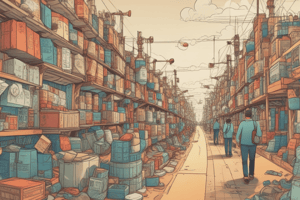Podcast
Questions and Answers
What best defines scarcity in economics?
What best defines scarcity in economics?
- The surplus of goods available for consumption
- The ability to fulfill all consumer wants at all times
- The unlimited supply of resources for producing goods
- The situation where demand for goods and services exceeds supply (correct)
Which of the following best represents the concept of opportunity cost?
Which of the following best represents the concept of opportunity cost?
- The total expenditure on a luxury good
- The benefit gained from an alternative that is not chosen (correct)
- The actual price paid for a product
- The amount spent on unnecessary items
In the context of resource allocation, which entity is primarily responsible for consumer spending?
In the context of resource allocation, which entity is primarily responsible for consumer spending?
- Firms
- Households (correct)
- Government
- International agencies
What type of wants must be satisfied regularly to maintain basic needs?
What type of wants must be satisfied regularly to maintain basic needs?
Which question is NOT one of the key economic principles regarding resource allocation?
Which question is NOT one of the key economic principles regarding resource allocation?
Which term describes wants that are derived from other wants, such as food being desired after the want for hunger?
Which term describes wants that are derived from other wants, such as food being desired after the want for hunger?
What does microeconomics primarily focus on?
What does microeconomics primarily focus on?
Which of the following best illustrates a basic want?
Which of the following best illustrates a basic want?
What does the PPF illustrate?
What does the PPF illustrate?
Which of the following is NOT an assumption of the PPF?
Which of the following is NOT an assumption of the PPF?
What would cause the PPF to shift outwards?
What would cause the PPF to shift outwards?
What is indicated when a production point lies inside the PPF?
What is indicated when a production point lies inside the PPF?
What does saving imply for future economic capacity?
What does saving imply for future economic capacity?
Which economic agent is primarily responsible for pricing and production decisions?
Which economic agent is primarily responsible for pricing and production decisions?
How can specialization affect the economy?
How can specialization affect the economy?
What does scarcity imply in an economy?
What does scarcity imply in an economy?
Flashcards are hidden until you start studying
Study Notes
Introduction to Economics
- Economics revolves around the study of how resources are allocated to satisfy unlimited wants versus limited resources.
- Scarcity arises when the demand for goods and services exceeds their available resources.
Economic Problem
- Households are the primary spenders, influencing consumer spending patterns.
- Firms invest in capital goods to produce output and meet market demands.
- Governments allocate funds across vital sectors such as education, infrastructure, and healthcare.
Microeconomics vs. Macroeconomics
- Microeconomics focuses on individual and firm behavior in resource allocation and interactions.
- Macroeconomics analyzes the economy's overall performance, structure, and decision-making processes.
Types of Wants
- Basic wants are essential for survival (e.g., food, water, clothing, shelter).
- Recurring wants must be satisfied regularly (e.g., continuous need for food and clothing).
- Substitute wants can replace one another based on preferences (e.g., choosing between a new or second-hand car).
- Luxury wants are desires beyond basic needs (e.g., vacations, technology).
- Complementary wants derive from other wants (e.g., cars requiring fuel).
- Individual wants reflect personal preferences and income capabilities.
- Collective wants represent community demands (e.g., healthcare, education).
Key Economic Principles
- Decisions revolve around four main questions: what to produce, how much to produce, how to produce, and how to distribute the output.
Choice and Opportunity Cost
- Unlimited wants necessitate choices in resource allocation, affecting living standards present and future.
- Opportunity cost refers to the value of the next best alternative foregone when making a decision (e.g., choosing to buy a donut instead of coffee).
Production Possibility Frontier (PPF)
- PPF illustrates the concepts of scarcity and opportunity cost, depicting various production combinations of two goods.
- Assumptions include: only two goods being produced, full employment of resources, fixed technology, and fixed resources with varied allocations.
Changes to PPF
- Technological advancements can lead to increased efficiency and an outward shift of the PPF, allowing for more production.
- An increase in resources (e.g., population growth) can also expand production capabilities and shift the PPF outward.
- Unused resources (e.g., unemployment) are represented within the PPF, indicating inefficiency.
Implications of Current Choices
- Current consumption at the expense of investment can diminish future production capacity.
- Saving contributes to increased productive capacity and potentially higher future living standards.
Economic Decision-Making Factors
- Individuals make choices regarding spending, saving, work, education, retirement, voting, and political participation.
- Businesses make decisions on pricing, production, resource allocation, and labor relations.
- Governments influence individual and business decisions through policy and regulation.
Resource Distribution
- Scarcity requires an effective distribution of goods and services within an economy.
- Specialization allows individuals and businesses to focus on production areas where they have a competitive advantage, maximizing resource use.
Studying That Suits You
Use AI to generate personalized quizzes and flashcards to suit your learning preferences.




